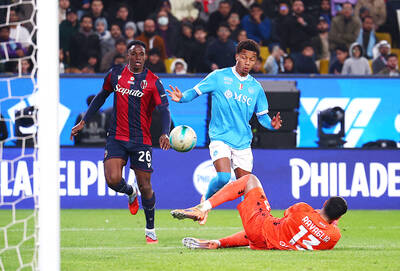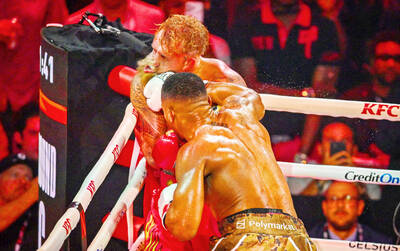NT$500 bills carry the image of Little League baseball players in a moment of glory. That’s how serious Taiwan is about its favorite game.
At a time when Taiwan’s professional baseball elite are shaken by game-fixing allegations, the nation stays devoted to its most popular sport because it is much more than just a pastime.
“Baseball is an important part of Taiwanese identity. People are proud of their baseball,” said Scott Simon, an anthropologist at the University of Ottawa who has done extensive research in Taiwan.

PHOTO: AFP
Taiwan is a highly diverse society but collective memories about baseball form part of the glue that holds it together.
“I remember when I was a little girl, perhaps five or six years old,” said Candy Lin, now 40, about the 1970s heyday of Taiwan’s participation in the Little League, a US-based organization that brings together players aged five to 18 from across the world for tournaments.
“When they were playing overseas, we’d get up in the middle of the night because of the time difference to watch our heroes live on TV,” she said.
Taiwan is not recognized by the vast majority of nations due to China’s efforts to isolate it internationally, and in this situation baseball is a crucial way to make its presence known.
The theory is that no society that can win the Little League World Series 16 times can be a nonentity, as Beijing claims.
One of the darkest moments in Taiwan’s history came in 1971, when the Republic of China on Taiwan was forced to hand over its seat in the UN to China.
“In the years right afterwards, baseball helped restore pride,” said Yu Chun-wei, a baseball expert at the National Taiwan Sport University in Taichung.
“Whenever Taiwan won the Little League, it meant enormous national confidence,” said Yu, who has written a book about the history of baseball in Taiwan.
When Taiwan was first introduced to baseball in the early 20th century, it was not a direct import from the US but came via Japanese colonizers.
The Japanese departed at the end of World War II in 1945, but they left behind baseball, much the way the British made cricket one of their lasting legacies in South Asia.
The Chinese Nationalist Party, which took over from the Japanese, were eager to eradicate most vestiges of the colonial period but soon gave up on baseball, finding it too firmly rooted.
Even so, the lukewarm Chinese attitude to the sport is reflected in the family backgrounds of most elite players even today.
“The majority of baseball players are Taiwanese, not descendants of people from the mainland [who fled China in the late 1940s],” Yu said.
Baseball underlines the differences between Taiwan and China, unlike the other globally successful US sport, basketball.
“Baseball is especially Taiwanese. Basketball is the opposite, because it’s also a big sport in the mainland. Basketball creates a commonality,” Simon said.
For all its popularity, Taiwanese baseball has had a tumultuous history, and the suspected game-fixing driven by high stakes illegal gambling now rattling the sport is just the latest in a series of scandals.
Prosecutors last month began investigations into alleged game-fixing in Taiwan’s professional league, the fifth time that a scandal of this type has emerged.
At least a dozen players have been named as defendants, while reports have pointed to links with notorious members of the island’s criminal underworld.
A legalized sports lottery began in May last year and sales reached nearly NT$8 billion (US$247 million) from January to July this year — with 60 percent of that accounted for by baseball.
Last year, Taiwan’s baseball league banned the dmedia T-Rex team over match-fixing allegations implicating the team’s management and three players, among others.
A scandal that erupted in 1996, the worst in the history of the sport in Taiwan, led to the disbanding of the China Times Eagles.
Despite the wave of bad news, observers believe the sport still has a future in Taiwan, citing the way it continues to attract genuine enthusiasm at the grassroots level.
“You see townships organize baseball games for the villages. Everyone loves it. It brings the communities together in a meaningful way,” Simon said.

TOOTHLESS: Bologna never looked like finding a way back, and Antonio Conte and his substitutes were waiting to celebrate long before the final whistle SSC Napoli on Monday lifted the Italian Supercoppa with a 2-0 win over Bologna in Riyadh, David Neres netting both goals to earn the league champions a deserved victory over the toothless Coppa Italia winners. Neres opened the scoring with a stunning strike from distance six minutes before halftime and found the net again in the 57th minute when Bologna were caught trying to play out of defense. “We came here as champions of Italy, we wanted this trophy and we showed it with a great performance,” Napoli forward Matteo Politano told Mediaset. “We could have scored a few more goals, but

Fulham on Monday climbed away from the English Premier League relegation zone and left Nottingham Forest mired in the fight for survival after Raul Jimenez’s penalty sealed a 1-0 win. Marco Silva’s side started the day just two points above fourth-bottom Forest, but Jimenez’s first-half goal at Craven Cottage moved them 10 points clear of the bottom three. While Fulham’s relegation fears were eased heading into the Christmas schedule, Forest are just five points ahead of third-bottom West Ham United in the scrap to avoid crashing into the Championship. Forest had won six of their previous eight games in all competitions, with a

LACKLUSTER FIGHT: At one stage, the referee lost patience with the two fighters, warning them in the fourth round that ‘the fans did not pay to see this crap’ Former world heavyweight champion Anthony Joshua on Friday knocked out YouTuber-turned-boxer Jake Paul in their controversial Netflix-backed bout in Miami. The fight at the Kaseya Center, which saw both men reportedly splitting a mammoth purse of US$184 million, had triggered alarm across boxing due to the gulf in physical size and class between Britain’s two-time former world champion Joshua and Paul, an Internet personality who has forged a lucrative career through a handful of novelty boxing contests. However, in the event, Joshua made hard work of defeating his vastly less accomplished opponent, before his superior size and power eventually told

English Premier League pair Mohamed Salah and Lyle Foster were match-winners on Monday as Egypt and South Africa began their Africa Cup of Nations Group B campaigns with victories in Morocco. Liverpool star Salah struck in the first minute of stoppage-time to snatch a 2-1 win for record seven-time champions Egypt over gallant Zimbabwe in Agadir. Earlier, second-half dominance by one-time title-holders South Africa paid off when Burnley striker Foster netted on 79 minutes to deliver a 2-1 victory over Angola in Marrakesh. The stage is now set for a top-of-the-table showdown between the Pharaohs and Bafana Bafana in Agadir on Friday. They